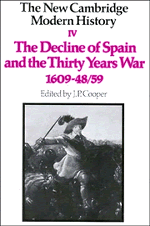Book contents
- Frontmatter
- INTRODUCTORY
- THE CENTRAL CONFLICTS
- THE UNMAKING AND REMAKING OF STATES
- Chapter XV The Spanish peninsula 1598–1648
- Chapter XVI French institutions and society 1610–61
- Chapter XVII The Habsburg lands 1618–57
- Chapter XVIII The fall of the Stuart monarchy
- CHAPTER XIX THE ENDING OF POLISH EXPANSION AND THE SURVIVAL OF RUSSIA
- THE FRONTIERS OF EUROPE
- References
Chapter XVI - French institutions and society 1610–61
from THE UNMAKING AND REMAKING OF STATES
Published online by Cambridge University Press: 28 March 2008
- Frontmatter
- INTRODUCTORY
- THE CENTRAL CONFLICTS
- THE UNMAKING AND REMAKING OF STATES
- Chapter XV The Spanish peninsula 1598–1648
- Chapter XVI French institutions and society 1610–61
- Chapter XVII The Habsburg lands 1618–57
- Chapter XVIII The fall of the Stuart monarchy
- CHAPTER XIX THE ENDING OF POLISH EXPANSION AND THE SURVIVAL OF RUSSIA
- THE FRONTIERS OF EUROPE
- References
Summary
At the death of Henri IV, his son Louis XIII was not yet nine years old. Kings of France came of age at thirteen and a day, so a regency was necessary. On 15 May 1610 the young king, from his lit de justice in the Parlement of Paris, appointed his mother, Marie de Medici, regent, according to his father's wishes. Periods of regency were always difficult for France and seemed to threaten the kingdom's dissolution. Jurists, political theorists and members of the government had a clear concept of the state, not shared by others, least of all by the nobility. They preferred a simpler concept of greater emotional force, loyalty between man and man, inherited from the feudal or remoter past. With the king dead and a child on the throne, it seemed as if every man had regained complete freedom, as if laws no longer existed, as if social obligations, society and the state had died with the king. On hearing of Ravaillac's attack, some nobles took to their fortified chateaux, while others roamed the countryside in bands, plundering, holding men to ransom and seizing the money in the royal coffers. The princes and magnates summoned their followers. In town and country tumult and sedition were rife.
The princes and magnates dreamed of regaining the independence they had enjoyed under Hugues Capet, both in their own domains and in the provincial governorships to which they were appointed by the king (which sometimes became hereditary), and in the apanages granted by the king to the princes and princesses of the royal blood and to queens-dowager.
- Type
- Chapter
- Information
- The New Cambridge Modern History , pp. 474 - 502Publisher: Cambridge University PressPrint publication year: 1970



